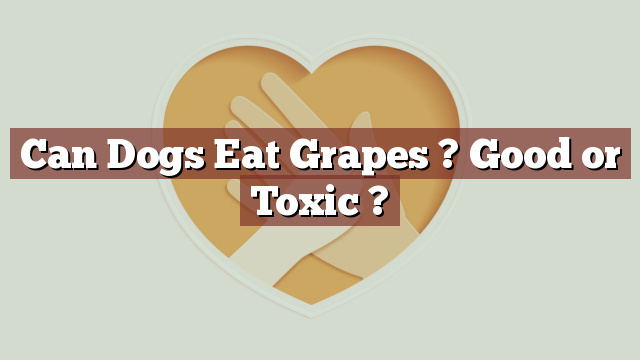Can Dogs Eat Grapes? Good or Toxic?
As pet owners, it is crucial to be aware of what foods are safe for our furry friends to consume. One common question that arises is whether dogs can eat grapes. Grapes and their dried counterparts, raisins, have long been a popular snack for humans, but is it safe for our canine companions to indulge in these fruits? In this article, we will explore the nutritional value of grapes for dogs, expert opinions on their safety, potential risks and benefits, and what steps to take in case your dog consumes grapes.
Nutritional Value of Grapes for Dogs: What’s Inside?
Grapes are packed with various nutrients that are beneficial for humans, such as vitamins C and K, fiber, and antioxidants. However, when it comes to dogs, their nutritional needs differ. Dogs require a balanced diet that primarily consists of protein, fats, and carbohydrates. While grapes do contain some nutrients that can be beneficial for dogs, it is essential to consider the potential risks associated with their consumption.
Are Grapes Safe or Toxic for Dogs: Expert Opinions
Grapes and raisins can be toxic to dogs. According to leading veterinary experts, even a small amount of grapes or raisins can cause severe health issues in dogs. The exact substance within grapes that leads to toxicity in dogs is still uncertain, but it is believed to be present in all varieties, whether red, green, or seedless. Additionally, it is important to note that the toxic effects can vary from one dog to another, making it challenging to predict the severity of the reaction.
Potential Risks and Benefits of Dogs Consuming Grapes
The consumption of grapes by dogs can lead to various adverse reactions. The most common symptoms of grape or raisin toxicity include vomiting, diarrhea, lethargy, loss of appetite, and increased thirst and urination. In severe cases, it can even cause acute kidney failure, which can be life-threatening. On the other hand, there are no significant health benefits that grapes provide exclusively to dogs. Therefore, it is best to avoid feeding grapes to your furry friend altogether.
My Dog Ate Grapes: Steps to Take in an Emergency
If you suspect that your dog has consumed grapes, it is crucial to take immediate action. First and foremost, contact your veterinarian or a pet poison helpline. They will be able to provide personalized advice based on your dog’s size, breed, and any pre-existing health conditions. The veterinarian may induce vomiting to prevent the absorption of toxins or suggest other necessary treatments. Remember, time is of the essence in such situations, so do not delay seeking professional help.
Conclusion: Grapes and Dogs – Better Safe than Sorry
In conclusion, the consumption of grapes by dogs can have severe consequences. The toxic effects of grapes or raisins on dogs’ health make it imperative for pet owners to exercise caution and avoid feeding them these fruits. While the exact substance responsible for the toxicity is still unknown, it is better to err on the side of caution. Always prioritize your dog’s well-being and consult a veterinarian for any concerns regarding their diet. Remember, a safe and healthy diet is essential for our beloved pets’ overall health and happiness.
Thank you for investing your time in exploring [page_title] on Can-Eat.org. Our goal is to provide readers like you with thorough and reliable information about various dietary topics. Each article, including [page_title], stems from diligent research and a passion for understanding the nuances of our food choices. We believe that knowledge is a vital step towards making informed and healthy decisions. However, while "[page_title]" sheds light on its specific topic, it's crucial to remember that everyone's body reacts differently to foods and dietary changes. What might be beneficial for one person could have different effects on another. Before you consider integrating suggestions or insights from "[page_title]" into your diet, it's always wise to consult with a nutritionist or healthcare professional. Their specialized knowledge ensures that you're making choices best suited to your individual health needs. As you navigate [page_title], be mindful of potential allergies, intolerances, or unique dietary requirements you may have. No singular article can capture the vast diversity of human health, and individualized guidance is invaluable. The content provided in [page_title] serves as a general guide. It is not, by any means, a substitute for personalized medical or nutritional advice. Your health should always be the top priority, and professional guidance is the best path forward. In your journey towards a balanced and nutritious lifestyle, we hope that [page_title] serves as a helpful stepping stone. Remember, informed decisions lead to healthier outcomes. Thank you for trusting Can-Eat.org. Continue exploring, learning, and prioritizing your health. Cheers to a well-informed and healthier future!

